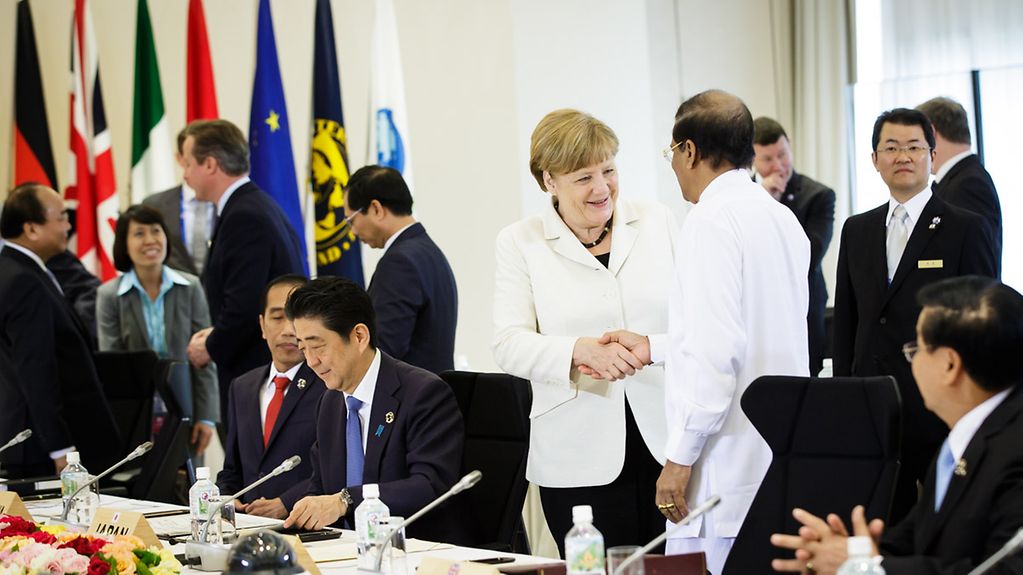G7 summit in Japan
Chancellor Angela Merkel has deemed the G7 summit in Japan a success. The seven heads of state and government intend to work together to revitalise the global economy.

On the second day of the summit, representatives of the outreach states joined the G7 nations
Photo: Bundesregierung/Steins
They also discussed the root causes of massive displacements and refugee movements, sanctions on Russia and women’s empowerment.
The summit meeting of the G7 states on the island of Kashikojima has come to a close after two days of hard work. Before flying home Chancellor Angela Merkel took positive stock of the summit. Overall the G7 summit continued the initiatives initiated by Germany at Schloss Elmau, reported Angela Merkel. She reported that the summit was a success "because we have managed over the last few years to develop a consistent ongoing working agenda".
It is very important to engage in in-depth discussions on topics other than the burning issues of the day, she said. "And we engage in these discussions here in the spirit of common understanding, shared values, and democratic principles."
Like the G20, the Group of Seven is not an international organisation, but an informal forum of heads of state and government. Germany, France, the United Kingdom, Italy, Japan, Canada and the USA together make up the G7. The European Union is also represented at all meetings.
Promoting the global economy, reducing barriers to trade
At the summit the Japanese side turned the spotlight on the global economy and trade, energy and climate. The G7 would like to see the Paris Climate Agreement come into effect before the end of 2016.
"Global growth is our urgent priority" says the Leaders’ Declaration. The G7 aim to use all policy tools including monetary, fiscal and structural measures to strengthen global demand and address supply constraints. They also undertake to continue their efforts to put debt on a sustainable path.
The Chancellor stressed the positive impacts that bilateral trade agreements have on economic growth. The German government is to continue its efforts in the field of trade and push to finalise the Transatlantic Trade and Investment Partnership (TTIP) this year.
The root causes of migration – a global challenge
On the question of refugees the Chancellor managed to gain the support of the major western industrialised nations. The Leaders’ Declaration reads, "The G7 recognises the ongoing large scale movements of migrants and refugees as a global challenge which requires a global response."
They agreed that it is essential to address the root causes of migration and refugee movements, and call on the international community to step up its efforts in the fields of conflict prevention and stabilisation. In their quest to identify solutions, the leading industrialised nations are to concentrate on reducing poverty. The agenda of the G7 nations is geared to ensuring that people are not forced to flee their homes, especially not for economic reasons.
If we take the example of Iraq, which is in the grips of civil war, the G7 states aim to stabilise the country. To this end they will provide the equivalent of 3.2 billion euros to fight terrorism and the root causes of massive displacement. Angela Merkel reported that this sum includes a German loan worth 500 million euros.
Sanctions on Russia
With respect to the situation in Ukraine, the Chancellor pointed to the lack of progress in the ongoing peace process. The process has not advanced at all, she said on the vital aspects of a new electoral law and holding local elections. "For me it is too early to give the all-clear," said Angela Merkel.
"Sanctions can be rolled back when Russia meets these commitments," reads the Leaders’ Declaration. "However, we also stand ready to take further restrictive measures in order to increase cost on Russia should its actions so require." The sanctions, said Angela Merkel, are "tied to meeting the commitments undertaken in the Minsk agreements. We hope to see progress in the next weeks".
In response to Russia’s annexation of the Ukrainian Crimea Peninsula in 2014, the G7 states imposed sanctions on Russia. They also shut Russia out of the G8 and returned to the G7 format.
Continuing the Elmau agenda
Some issues of the Japanese G7 Presidency were initiated by the German G7 Presidency last year, including empowering women and facilitating their access to the job market. These are issues that are particularly important in Germany. The G7 intend to encourage women to train for and work in professions in what are known as the STEM fields, i.e. Science, Technology, Engineering and Mathematics, all degree courses in which women account for a disproportionately low percentage of students.
The leading industrialised nations also intend to fight gender-based violence.
It is the declared goal of the German government to work together to bring the world forward. Not all planned measures to emerge from the summit in Japan will have immediately tangible impacts. Dialogue and understanding help, however, to appreciate the needs of other countries and identify solutions together.


















